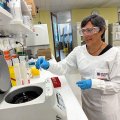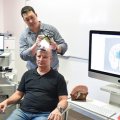
The University of Queensland has joined industry partners in a program designed to help ensure a major mining project takes account of the needs of Solomon Islands communities and the environment.
The partnership between UQ’s School of Civil Engineering, international consulting firm Golder Associates Pty Ltd and global group Sumitomo Metal Mining will undertake an environmental and social impact assessment of a proposed large-scale nickel mine in the Solomon Islands.
Lead researcher and School of Civil Engineering academic Dr Simon Albert said the mining project had the potential to provide significant benefits to the economy of the Solomon Islands, but it was essential that diverse social and environmental values were maintained.
“Given the local communities rely on marine and terrestrial resources for food, transport, medicine and shelter, it is critical to minimise the impact of the project on the local environment through the implementation of sustainable practices,” Dr Albert said.
He said the Solomon Islands had limited development opportunities to support the government in providing essential services to the mostly rural communities.
“The few resource extraction activities that do exist often come at a high environmental cost due to limited environmental regulations and small companies with limited experience,” Dr Albert said.
The Sumitomo Solomon Islands Nickel Project brings together Sumitomo’s 400-year history in mining, Golder’s global experience in environmental and social impact assessments and UQ’s world-class research capacity.
Dr Albert said this would ensure the project was well placed to minimise environmental impacts through the implementation of sustainable practices.
The UQ research team consists of Dr Albert, Dr Alistair Grinham and Dr Badin Gibbes, who have expertise in research on the environment, water resources and hydrology.
Dr Grinham said it was essential that marine water quality was monitored throughout the process to ensure international guidelines were met.
“This project provides a rare chance to collect high-precision data from the top of the catchment, freshwater streams, estuaries, coral reef lagoons, and down to deep sea that we can use to guide numerical models,” Dr Grinham said.
School of Civil Engineering head Professor José Torero said the project recognised the School’s reputation in producing high-quality research.
“This phase of the project is worth approximately $1 million, providing significant research experience to the School and the University,” Professor Torero said.
“These types of partnerships raise the School’s profile in the water and mining industry, which can lead to further opportunities within these sectors.
“Initial scoping of the study has been completed, and the first round of field monitoring and research is scheduled to begin this month.”
Media: Madelene Flanagan (m.flanagan@uq.edu.au or + 61 7 3365 8525)
.jpg)










